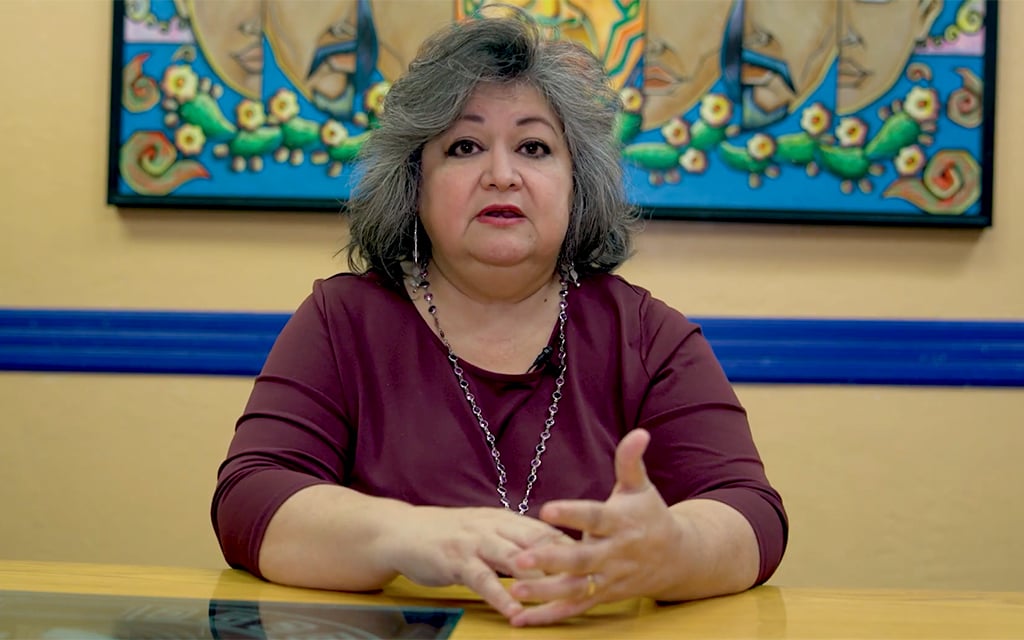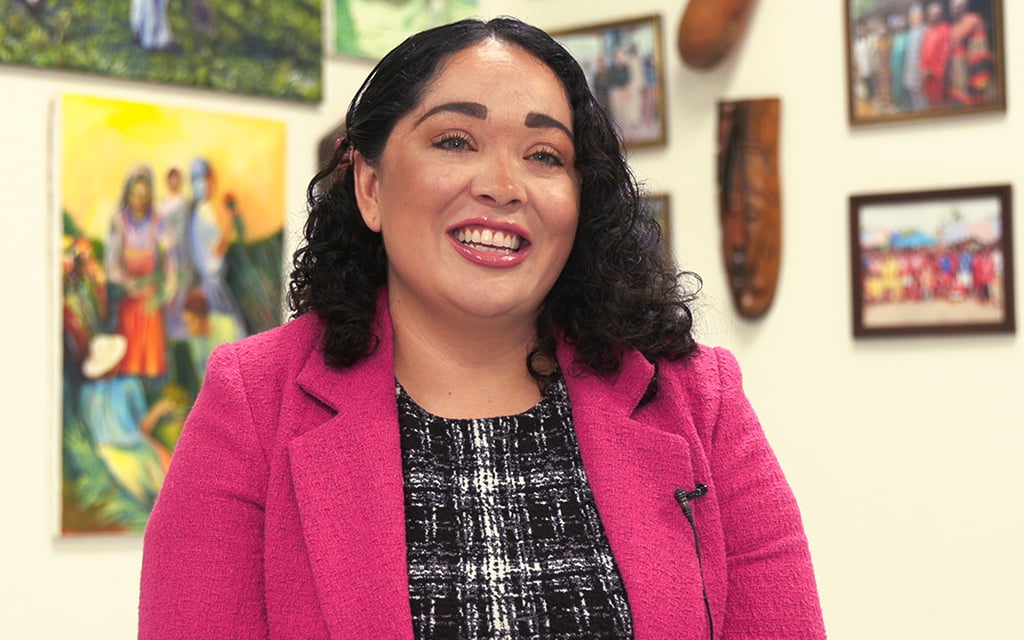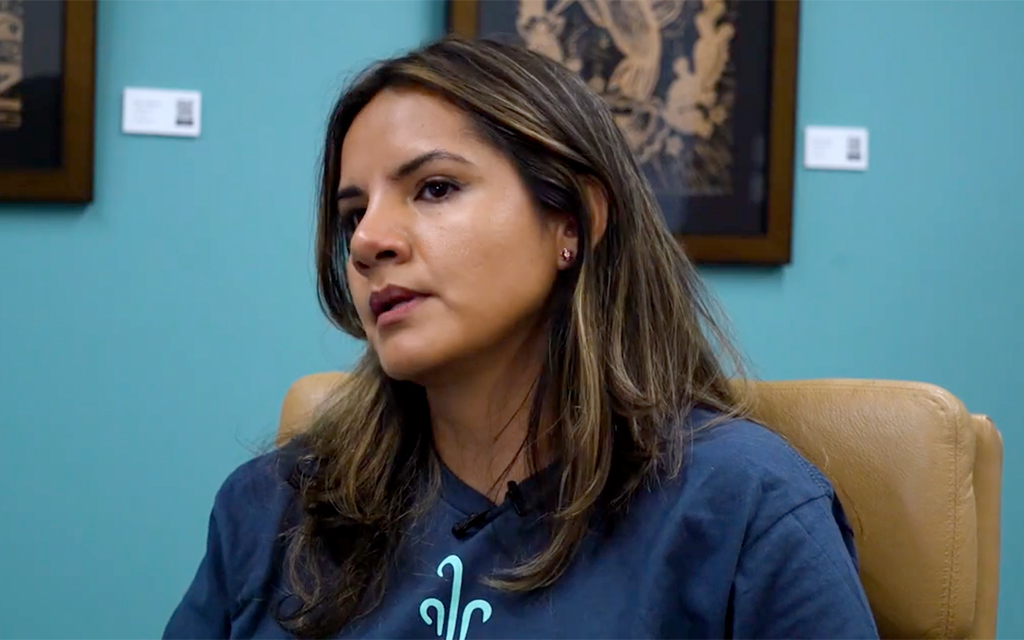PHOENIX – Ileana Salinas has to renew her immigration status this year. If she misses the deadline or doesn’t get approved, she doesn’t know what will happen to her job, her family, or her life in the United States. Living each day in survival mode has taken a toll on her mental health, and the ever-changing slew of immigration policies are compounding the problem.
Salinas is a recipient of temporary immigration protection under the Deferred Action for Childhood Arrivals initiative, or DACA, enacted by the Obama administration in 2012. This program was intended to temporarily alleviate the threat of deportation for the hundreds of thousands of undocumented youth who immigrated to the United States as children.
As of Sept. 30, 2023, there were 544,960 active DACA recipients in the U.S., 20,750 of them in Arizona according to the most recent numbers from U.S. Citizenship and Immigration Services. California and Texas had the most DACA recipients last year, while Arizona had the seventh highest number among states.
But that may only be a fraction of those eligible to participate in DACA, according to the Migration Policy Institute, which estimated that as many as 1.16 million people in the U.S. and 44,000 in Arizona could be eligible for protection.
“I am grateful because I have gotten to taste what an American dream is like,” Salinas said. “But at the same time, it’s living your life two years at a time.”
DACA recipients must continue to renew their legal status every two years amid extended legal challenges that could result in the loss of legal status for over half a million people. While DACA recipients can be authorized to work, they are ineligible for federal health programs such as Medicaid, the Children’s Health Insurance Program and the Affordable Care Act marketplace. According to KFF, a nonprofit foundation providing health policy research and news, these restrictions result in higher uninsured rates among DACA recipients and contribute to barriers accessing both general health care and mental health care.
A fact sheet published by the National Immigration Law Center found that nearly half of respondents who indicated that they have mental or behavioral health issues said they were not accessing psychiatric or therapeutic mental health services.
In Arizona, Salinas’ home for the past 18 years, advocates say anti-immigrant policies like SB 1070 have fostered a culture of fear that prevents undocumented immigrants and DACA recipients from accessing the mental health care needed to address the anxieties caused by those same policies. Now, those policies are being replicated across the country.

Lydia Guzman, director of advocacy and civic engagement at Chicanos Por La Causa. (Photo by John Leos/Cronkite News)
A “laboratory” for immigration policy
“An anti-immigrant policy altogether.”
This is how Lydia Guzman described Arizona’s SB 1070. Guzman is the director of advocacy and civic engagement at Chicanos Por La Causa, an Arizona organization that provides behavioral health and other services for Latino communities, and advocates for economic and political empowerment. She says SB 1070, introduced as the Support Our Law Enforcement and Safe Neighborhoods Act in 2010, came to be known as the “show me your papers law,” because it allowed police to arrest individuals without a warrant if there was suspicion a person was undocumented. It also punished American citizens who were seen as aiding undocumented immigrants.
“It called to punish immigrants in every way possible,” said Guzman, whose organization challenged the law in federal court. “If somebody was transporting an immigrant, if somebody was harboring an immigrant, it asked for people to report immigrants. It asked for police officers to turn over immigrants to immigration.”
Provisions in the law were struck down by the U.S. Supreme Court in 2012, but SB 1070 is still on the books in Arizona. Now, the controversial legislation is inspiring replicas across the country, including recent anti-immigrant legislation in Texas and Florida, Guzman said.
“Arizona seems to be the laboratory,” Guzman said, referring to the history of Arizona’s immigration policies. “Other states are passing it, and they resurge.”
It’s not only SB 1070. Florida’s SB 1718, which was signed into law in 2023 by Gov. Ron DeSantis, a Republican currently running for president, includes a provision requiring hospitals to ask patients about their immigration status and report that data to the state. This provision mimics a bill that was introduced, but not passed, in the Arizona Legislature in 2013.
Immigration advocates say that these types of bills deter undocumented people and their families from seeking health care for fear of being reported to immigration authorities.
“A lot of people who want to apply for citizenship are told you can’t apply for benefits,” said Briana Felix, the executive director for the National Alliance on Mental Illness (NAMI) Southern Arizona. “They are told, don’t have any interactions because that can affect your citizenship status.”

Briana Felix is the executive director of the National Alliance on Mental Illness Southern Arizona, an organization that helps connect those affected by mental illness and their families to free resources like educational programs and support groups. (Photo by John Leos/Cronkite News)
A culture of fear and uncertainty
Undocumented people in Arizona are not eligible for Medicaid under the Arizona Health Care Cost Containment System, which handles Medicaid and Medicare in Arizona, except under certain conditions, like emergencies and medically necessary services like labor and delivery. This means they also lack eligibility for low-cost behavioral health services until a serious risk of self-harm or physical violence against another person exists as a result of a mental health condition.
Some organizations are working to fill the gaps caused by those being priced out of care. Chicanos Por La Causa gets funding for some substance abuse services through federal grants, and the NAMI Southern Arizona provides no-cost resources like support groups and case management to those affected by mental illness and to their families. But advocates, like Felix, say a culture of fear and uncertainty can prevent immigrants from accessing this care even as organizations strive to provide more culturally competent care.
A 2014 study by researchers at Arizona State University and Harvard University found expectant mothers of Mexican origin were less likely to access preventive health care and public assistance after the passage of SB 1070, “perhaps as a result of fear of deportation or perceived lack of safety.”
In 2019, the Trump administration broadened the public charge rule, which allows U.S. immigration authorities to deny visas and green cards to applicants who they think are likely to become dependent on government assistance. This expanded rule included health care benefits like Medicaid as a public charge.
Courts blocked the rule before it could take effect. But not before a decline in all health care utilization for adult immigrants and their families, according to a survey by KFF, which stated that nearly a third of health centers surveyed across the country reported declines in immigrants seeking care after the new public charge rule was announced.
Although the policy was abandoned after President Joe Biden took office in 2021, a coalition of state governments, led by former Arizona Attorney General Mark Brnovich, argued before the U.S. Supreme Court in 2022 to keep the expanded rule. The justices declined to issue a ruling on the case, leaving in place lower court rulings that had blocked the expansion.
“We need to do better to educate the community about the folks that can still access a lot of the benefits, because many still can,” Guzman said. “The fear is too big … we need everyone in the community to talk about this.”

Ileana Salinas, a DACA recipient and program manager at Aliento, which provides services to undocumented youth and families. (Photo by John Leos/Cronkite News)
Building community and taking action
For Salinas, the cure for her feelings of isolation was community organizing and expanding informal mental health care for undocumented immigrants and their families.
Salinas is a program manager at Aliento, a nonprofit organization that provides resources to undocumented youth and families with mixed immigration status. Salinas’ outreach program, Cultiva, gives informal arts and healing workshops with the goal of building community, freeing immigrant youth from thoughts of isolation and breaking down the cultural stigma surrounding mental health.
“One of the biggest barriers to mental health access is the mental health stigma in the Latino population,” Salinas said. “Asking for help means that you are pretty much saying you are loco or insane, and that stigma is really what limits people from asking for help.”
Aliento’s workshops are designed to break down these barriers with cultural awareness, bilingual instruction and lessons from trauma-informed therapy to create community services unique to the immigrant experience.
Salinas also became involved in advocacy campaigns to change the policies that indirectly affected the collective mental health of her community, including organizing with Aliento for the passage of Proposition 308 by Arizona voters in 2022. This proposition reinstated in-state tuition status to certain groups of undocumented students and overturned a prohibitive measure passed in 2006.
“We need to take action in order to have a change,” Salinas said. “But the attitude of hope is what really helps to build community.”
– Cronkite News is part of the Mental Health Parity Collaborative, a group of newsrooms that are covering stories on mental health care access and inequities in the U.S. The partners on this project include The Carter Center, the Center for Public Integrity and newsrooms in select states across the country.

